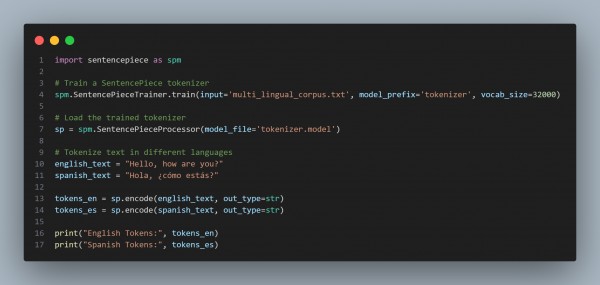Challenges and solutions for data tokenization in multi-lingual generative models are as follows:
Challenges in Multi-lingual Tokenization:
- Vocabulary Size: Handling large vocabularies for diverse languages leads to memory and efficiency issues.
- Rare Tokens: Languages with fewer training examples produce many out-of-vocabulary (OOV) tokens.
- Script Variability: Different scripts (e.g., Latin vs. Cyrillic) require flexible tokenization strategies.
- Consistency: Tokenization inconsistencies across languages impact model performance.
Solutions for that:
- Subword Tokenization: It uses algorithms like Byte Pair Encoding (BPE) or SentencePiece to generate subword units shared across languages.
- Shared Vocabulary: Train a common vocabulary to leverage cross-lingual transfer.
- Language Tags: It Adds language-specific tokens (e.g., <en> for English) to guide the model.

The outcome of the above code would be that subword tokenization handles OOV words efficiently, and shared vocabulary supports cross-lingual understanding.
 REGISTER FOR FREE WEBINAR
X
REGISTER FOR FREE WEBINAR
X
 Thank you for registering
Join Edureka Meetup community for 100+ Free Webinars each month
JOIN MEETUP GROUP
Thank you for registering
Join Edureka Meetup community for 100+ Free Webinars each month
JOIN MEETUP GROUP